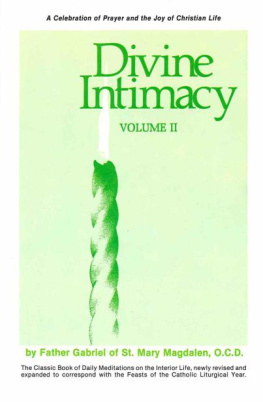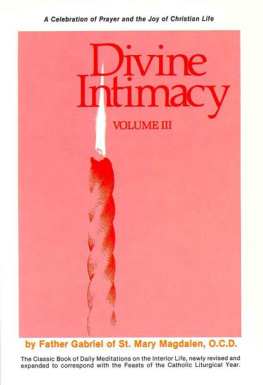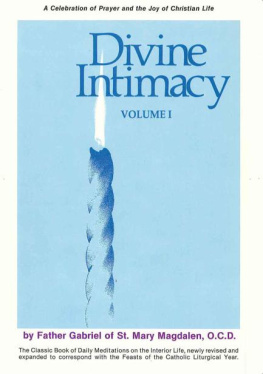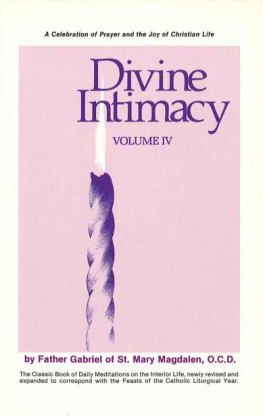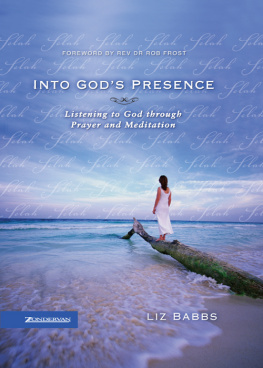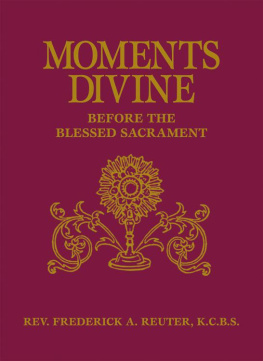FATHER GABRIEL OF ST. MARY MAGDALEN, O.C.D.
DIVINE INTIMACY
Volume II
Ash Wednesday through Pentecost
IGNATIUS PRESS SAN FRANCISCO
This enlarged and revised edition was
previously published by Dimension Books, Inc.
Translated from the Sixteenth Italian Edition
Carmelite Monastery of Pittsford, N.Y.
With ecclesiastical approval
Carmelite Monastery, Pittsford, N.Y. 14534
All rights reserved
Reprinted with permission of Dimension Books, 1987
ISBN 978-0-89870-143-2
Library of Congress catalogue number 86-83132
Printed in the United States of America
Meditation
year A
year B
year C
year A
year B
year C
year A
year B
year C
year A
year B
year C
year A
year B
year C
year A
year B
year C
year A
year B
year C
year A
year B
year C
year A
year B
year C
192. THE ASCENSION OF THE LORD
Thursday of the Sixth Week After Easter
year A
year B
year C
Sacred Scripture
Authors and Works Frequently Cited
Miscellaneous
English Sources
Foreign Sources
107ASH WEDNESDAY
Be merciful, O Lord, for we have sinned (Resp Ps)
1. You are dust and to dust you shall return (Gen 3:19). These words were spoken for the first time by God to Adam as a consequence of his sin, and are repeated by the Church to every Christian to remind him of three fundamental truths: his nothingness, his status as sinner, and the reality of death.
Dust, the ashes which the priest puts on our foreheads today, has no substance; the lightest breath will disperse it. It is a good representation of mans nothingness: Lord... my lifetime is as nothing in your sight (Ps 39:5), exclaims the psalmist. Our pride needs to be broken before this truth! In ourselves, we are not only nothing, we are also sinners, who make use of the very gifts of God to offend him. Today the Church calls upon us, her children, to bow our heads to receive the ashes as a sign of humility, imploring pardon for our sins; at the same time she reminds us that as punishment for our offenses, we must one day return to dust.
Sin and death are the bitter and inseparable fruits of mans rebellion against God. God did not make death (Wis 1:13); it came into the world through sin; and the sad wages of sin is death (Rom 6:23). Created by God for life, joy, and holiness, we bear in ourselves an eternal seed (GS 18); therefore we cannot but suffer in the face of sin and death which threaten to impede us in the attainment of our goal, and hence, in the full realization of our being. Yet the Churchs invitation to reflect upon these painful truths is not intended to dishearten us by a pessimistic view of life, but rather to open our hearts to repentance and hope. If Adams disobedience introduced sin and death into the world, Christs obedience brought their remedy. Lent prepares us to celebrate the paschal mystery which is precisely the mystery through which Christ saves us from sin and from eternal death, while it converts physical death into the way to true life, to beatific and never-ending communion with God. Sin and death are conquered by Christs death and resurrection; we shall share in his victory in proportion as we share in his death and resurrection.
2. Thus says the Lord: Return to me with all your heart, with fasting, with weeping, and with mourning; and rend your hearts and not your garments (Joel 2:12-13). The essential element in conversion is really heartfelt contrition: a heart broken and mortified in its repentance for sin. Sincere repentance, in fact, includes the desire to amend ones life, and leads in practice to such an attainment. No one is exempt from this obligation: all of us, even the most virtuous, always need conversion; that is, we need to turn to God more completely and more fervently, and to overcome the weaknesses and frailties which lessen our total orientation toward him.
Lent is the traditional time for this spiritual renewal: Now is the acceptable time... now is the day of salvation (2 Cor 6:2), notes St. Paul; each of us should make it a decisive moment in the history of our own personal salvation. We beseech you on behalf of Christ, be reconciled to God, he insists, and adds: we entreat you not to accept the grace of God in vain (ib. 5:20; 6:1). It is not only the soul in mortal sin that needs to be reconciled with the Lord; every lack of generosity or of faithfulness to grace hinders intimate friendship with God, chills our relations with him, and is a rejection of his love; all of this requires penance, conversion and reconciliation.
In the Gospel (Mt 6:1, 6-18), Jesus himself points out the chief means of sustaining the work of conversion: almsgiving, prayer fasting; and he insists on the part our interior dispositions play in making these effective. Almsgiving atones for sins (Sir 3:30) but only when done with a sincere desire to please God and to relieve some one in neednot from a desire for praise. Prayer unites man with God and implores his grace when it pours forth from the depths of the heart, but not when reduced to vain ostentation or empty words. Fasting is a sacrifice which pleases God and atones for our faults, provided this mortification of our body is accompanied by the much more important mortification of self-love Only then, Jesus concludes by saying, your Father who sees in secret will reward you (Mt 6:4, 6:18), that is, he will forgive your sins and grant you ever increasing grace.
You are merciful to all, O Lord, and hate nothing you have created. You overlook the sins of men to bring them to repentance You are the Lord, our God (Entrance Ant.) O God, bless the sinner who asks for your forgiveness, bless all those who receive these ashes. Grant that they may keep this Lenten season in such a way that, fully renewed in spirit, they may celebrate with joy the paschal mystery of Christ . Roman Missal (Blessing of Ashes) O Jesus, how long is the life of man, even though it is said to be short! It is short, my God, for gaining through it a life that cannot end; but it is very long for the soul that desires to come into the presence of its God . Then, my soul, you will enter into your rest when you become intimate with this supreme Good, understand what he understands, love what he loves, and rejoice in what gives him joy. Now, you will find you have lost your changeable will; now, there shall be no more change!... You shall always want to enjoy him together with his love. Blessed are those who are written in the book of this life. But you, my soul, if you are written there, why are you sad arid why do you disturb me? Hope in God, for even now I will confess to him my sins and his mercies...O Lord, I want to live and die in striving and hoping for eternal life more than for the possession of all creatures and all their goods; for these will come to an end. Do not abandon me, Lord, because I hope that in you my hope will not be confounded . If we are sorry for having offended him our faults and evils will not be remembered Oh, compassion so measureless! What more do we desire? Is there by chance anyone who is not ashamed to ask for so much? Now is the time to take what this compassionate Lord and God of ours gives us. Since he desires our friendship, who will deny it to one who did not refuse to shed all his blood and lose his life for us ?St. Teresa of Jesus, Soliloquies 15:1, 17:5-6; 14:3
108THEREFORE CHOOSE LIFE
Blessed is the man whose delight is in the law of the Lord (Ps 1:1-2)
1. When Moses was exhorting the people of Israel to be faithful to God, he proposed a far-reaching choice to them: either love the Lord, obey his commandments, and thus obtain his blessings, or turn your back on him, follow other gods, and, as a result, proceed in the face of divine curses. I have set before you life and death, blessing and curse; therefore choose life, that you may live (Deut 30:19). God alone is the one who is living, the source of life; only one who chooses him and his word, chooses life, and through this choice will live. It is not enough to make this choice once for all, it must be renewed and lived day by day, in important situations and in the most humble; everything must be seen, weighed and chosen in the light of faith, as fixed by God and in harmony with his word.
Next page
